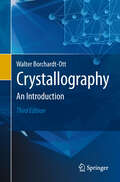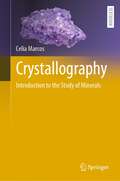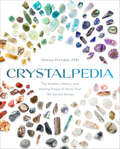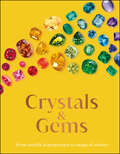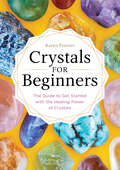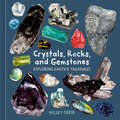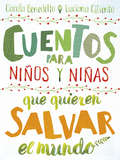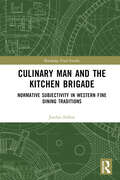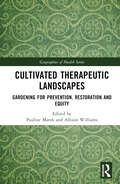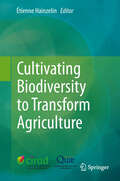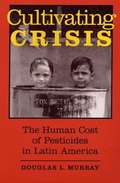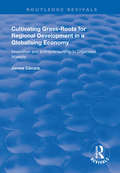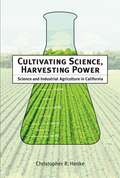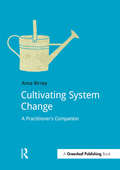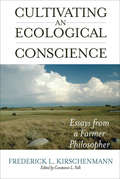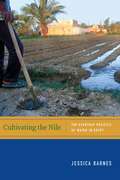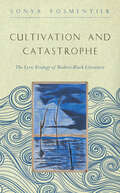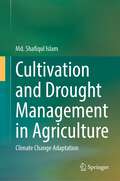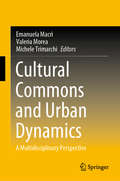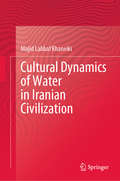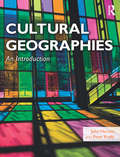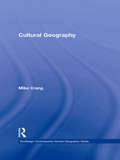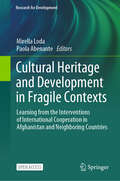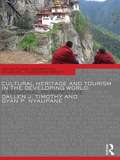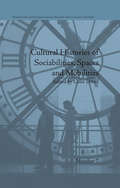- Table View
- List View
Crystallography: An Introduction
by Walter Borchardt-Ott Robert O. GouldAs a self-study guide, course primer or teaching aid, Borchardt-Ott's Crystallography is the perfect textbook for students and teachers alike. In fact, it can be used by crystallographers, chemists, mineralogists, geologists and physicists. Based on the author's more than 25 years of teaching experience, the book has numerous line drawings designed especially for the text and a large number of exercises - with solutions - at the end of each chapter. This 3rd edition is the translation of the seventh German edition with new chapters focused on crystal chemistry and x-ray diffraction methods.
Crystallography: Introduction to the Study of Minerals (Springer Textbooks in Earth Sciences, Geography and Environment)
by Celia MarcosThis textbook presents an extensive manual of crystallography, including geometric crystallography, crystallochemistry, and crystallophysics. Illustrated with a wealth of figures and diagrams, it offers a thorough introduction to crystals for undergraduate and graduate students interested in learning the essentials and advanced concepts of crystallography.The book begins with basic concepts such as the geometry, morphology and symmetry of lattices, allowing readers to approach the subject from a mathematical point of view, abstracting it from its material content. In turn, the second part focuses on crystallochemistry and explains the differences between ideal and real crystals, and between static and dynamic ones. The third part of the textbook concerns crystallophysics and addresses the electrical, magnetic, mechanical, elastic and optical properties of crystals, as well as the fundamental laws and methods of X-ray diffraction.
Crystalpedia: The Wisdom, History, and Healing Power of More Than 180 Sacred Stones A Crystal Book
by Athena PerrakisDiscover the healing power of more than 180 crystals in this ultimate guide to mineral magic Crystals have been used for centuries around the world to promote wellness, fertility, prosperity, healing, and more. Founder of America&’s largest retailer of gemstones, Sage Goddess, and bestselling author of three books on metaphysical topics, Dr. Athena Perrakis dove deep into the crystal literature on a quest to heal herself and discovered the profound power of healing crystals. In this A to Z compendium of crystal wisdom designed both for beginners and advanced crystal healers, she collects their histories, geologies, mythologies, and healing capabilities all in one place for the first time. In these pages, you&’ll learn:• Where each crystal originated in the earth&’s core• The science behind its beauty and magical qualities• How best to use each crystal for healing• Its resonance with your chakras and astrology• How to integrate each crystal into your daily routine• Rituals for better sleep, manifestation, harnessing the power of the full moon, and moreWith dazzling photography, this book is not only a reference guide but also an oracle to guide your journey, whatever your goal is. Simply set an intention, ask a question, and then flip through the pages until your intuition tells you to stop. You&’ll meet the stone you are being guided to discover. It&’s time to unlock the power and wisdom held within the Earth&’s sacred stones.
Crystals and Gems (DK Secret Histories)
by DKDiscover the history of precious, semi-precious, and organic gemstones, their scientific properties, their mythical powers, and their traditional uses.Humans have been beguiled and fascinated by gemstones and crystals since prehistory, and made use of them for everything from currency and ceremonial decoration to tokens of love or power. But why have some been considered more significant than others – rare or otherwise? Learn all about the key characteristics of precious and semi-precious stones, and discover the science behind some of their more unusual and mysterious properties, and the various ways in which they have taken on powerful symbolic meanings. How did the Vikings use iolite to help them steer their ships, for example? Why did the Ancient Greeks and Romans believe that sardonyx could protect them in battle?Dive deep into the pages of this curated crystal book to discover:- A quirky and compelling angle on the subject of crystals and gems – combining science with culture and history.- Definitions for the key properties of precious, semi-precious, and organic stones, clearly and simply.- Explores their traditional uses in healing and manifesting, and the powers they have been ascribed through the centuries.Encounter the fascinating stories of some of the most famous or celebrated gemstones and jewels along the way – from a turquoise-studded pectoral worn during Aztec ceremonies, to the diamond necklace that helped to bring about the French Revolution – in this glorious celebration of precious, semi-precious, and organic stones in all their beauty and variety.
Crystals for Beginners: The Guide to Get Started with the Healing Power of Crystals
by Karen FrazierPerfect for spiritual and personal growth, Crystals for Beginners profiles over 50 of the most-loved crystals for comfort, balance, and emotional healing.Discover how crystals and healing stones can help you fight stress, cope with anxiety, and more as you explore the basics of crystal healing using this veritable crystal bible. With simple guidance, you'll learn to curate your own crystal collection, and get detailed crystal profiles that will help you choose the crystal that works best for you.Unearth the power of crystals with the ultimate book on crystals and stones and their meanings:CLEAR INSTRUCTIONS FOR CURATION: Go beyond other books on crystals and healing stones with one that explores every facet of healing, including how to use different crystals and the top 10 crystals every collection should have.HEALING REMEDIES: Foster positive growth using specific crystal prescriptions, healing mantras, and crystal grids that help you focus energy and intention while balancing your chakras to feel better in your body and be your best self.COMPREHENSIVE CRYSTAL PROFILES: Learn to identify different crystal types, their properties, and meanings with 50 detailed crystal profiles.Harmonize and heal your body, spirit, and mind to change your life with this healing crystals book.
Crystals, Rocks, and Gemstones: Exploring Earth's Treasures
by Kelsey OseidA beautifully illustrated, entertaining, and educational guide to the world&’s crystals, rocks, gemstones, and other geological phenomena from the acclaimed author of What We See in the Stars.Rocks and minerals have captivated the human imagination for centuries. Crystals, Rocks, and Gemstones explores the most interesting and illuminating facts about these precious treasures, from how rocks form and why gems come in different colors, to what makes a diamond valuable and why people feel a spiritual connection with crystals. Did you know that fossils made entirely out of iridescent opal have been found? Or that the ancient Egyptians believed that adorning mummies with emeralds ensured safe passage to the afterlife? With gorgeous illustrations on every page, this covetable guide delves into the natural history, uses, and cultural significance of over 80 stones, their place in our history, and our fascination with these gifts of the earth. Perfect for lovers of nature, rock collectors, and crystal afficionados, Crystals, Rocks, and Gemstones will delight and inspire readers of all ages.
Cuentos para niños y niñas que quieren salvar el mundo
by Carola Benedetto Luciana Ciliento16 vidas extraordinarias de personas que luchan cada día por salvar el medio ambiente. 16 historias para los pequeños héroes que salvarán nuestro planeta. ¡Somos la última generación que puede cambiar el mundo! Nunca se es demasiado jóven para salvar el mundo. Este es el mensaje que transmiten los 16 cuentos de este libro. 16 vidas extraordinarias de personas que luchan cada día por salvar el medio ambiente. 16 historias para los pequeños heroes que salvarán nuestro planeta. De Leonardo di Caprio a Emma Watson, pasando por supuesto por Greta Thunberg o Pierre Rabhi (considerado como el Gandhi de la ecología), el libro cuenta dieciséis historias ejemplares de personas que luchan por el medio ambiente y, por lo tanto, por salvar el planeta.
Culinary Man and the Kitchen Brigade: Normative Subjectivity in Western Fine Dining Traditions (Routledge Food Studies)
by Jordan FallonCulinary Man and the Kitchen Brigade offers an exploration of the field of normative subjectivity circulated within western fine dining traditions, presenting a theoretical analysis of the governing relationship between the chef, who embodies the Culinary Man, and the fine dining brigade.The book offers a unique treatment of western haute cuisine’s interlocking regime of labor and aesthetics and theorizes the underexplored kitchen brigade as a model of disciplinary formation. It deploys a heterogeneous set of disciplinary discourses and practices which have the effect of consolidating monopolies on epistemic authority and governance. Each position within the brigade’s hierarchy is subject to distinct, though related, disciplinary practices. Thus, chapters identify the specific practices pertinent to each brigade subject, while also illuminating how they fit together as a coherent hegemonic project. The application of Wynterian and Foucauldian insight to the fine dining brigade offers a political theory of culinary work which departs from other food studies texts. Notably, this work offers an in-depth treatment of the brigade’s colonial dimensions which resonate with emerging critiques, scholarly and general, of the race and gender politics of restaurant labor. The concluding chapters seek to identify where extant modes of resistance or alternative forms of culinary organization may hold the potential to move beyond the hegemonic overrepresentation of Culinary Man.This book will be of great interest to students and scholars from across the social sciences and humanities interested in critical food studies, political and cultural theory, and popular culinary culture.
Cultivated Therapeutic Landscapes: Gardening for Prevention, Restoration, and Equity (Geographies of Health Series)
by Allison Williams Pauline MarshCultivated Therapeutic Landscapes provides an in-depth and critical explora-tion of the impact of gardens and gardening on health and wellbeing. In this book we explore the ways in which gardens and gardening prevent illness and restore wellbeing, and how they improve social and health equity via tradi-tional and innovative mechanisms and across a range of sites. Therapeutic landscapes are relational, reciprocal, and evolving. In this book, leading scholars from across the globe demonstrate how therapeutic landscapes research and practice is expanded through and around the pro-cesses of cultivation. Deliberately interdisciplinary, the book explores how tending and caring for green spaces, collectively and individually, works to pre-vent and restore health and wellbeing, as well as impact upstream factors de-termining social justice and equity. A unique combination of academics, clinicians, and practitioners deliver theoretical and practical insights into wide-ranging health-enabling factors, based on new evidence and autoethno-graphic experiences in home gardens, school, and community gardens, clinical settings, public green spaces, and sites of conservation and wildness. This book pushes concepts of cultivation and horticulture into underexplored spatial, on-tological, and wellbeing territories. Despite long-term practical interest, thera-peutic horticulture is only now establishing a strong theoretical and research foundation. This book provides much-needed critical insights into the impact on the key drivers of health, wellbeing, and social equity, with a focus on practical skills for utilising horticulture or designing for particular health needs. It will be of interest to students, scholars, and practitioners in the areas of health geogra-phy; cultural geography; cultural studies; therapeutic horticulture; environ-mental studies; community development and planning; landscape architecture; social work; health studies; and health policy.
Cultivating Biodiversity to Transform Agriculture
by Étienne HainzelinHow can cultivated plant biodiversity contribute to the transformation and the "ecologization" of agriculture in Southern countries? Based on extensive field work in the Southern countries, a great deal of scientific progress is presented in all areas affecting agriculture (agronomy, plant breeding and crop protection, cultivation systems, etc. ) in order to intensify the ecological processes in cultivated plots and at the scale of rural landscapes.
Cultivating Crisis: The Human Cost of Pesticides in Latin America
by Murray Douglas L.In this study, Douglas Murray draws on ten years of field research to tell the stories of international development strategies, pesticide problems, and agrarian change in Latin America. Interwoven with his considerations of economic and geopolitical dimensions are the human consequences for individual farmers and rural communities.
Cultivating Grass-Roots for Regional Development in a Globalising Economy: Innovation and Entrepreneurship in Organised Markets (Routledge Revivals)
by James CécoraFirst published in 1999. The key to successful regional development is more a personality issue than a global one, contends social economist Dr. James Cécora. With a fresh new interdisciplinary approach, Cécora tackles traditional economic theory to show that a distinct type of individual, the 'innovative entrepreneur', can do more to secure economic stability in a particular region than any multinational corporation. Arguing that global economics have spiraled out of control, Cécora builds a case for supporting and promoting the development of entrepreneurs at the local and regional level. These individuals will, he says, work at strengthening the regional economy over the long term because of their permanent attachment to a region, as well as in vested self-interest. Cécora compares the personalities of corporate managers to self-starting entrepreneurs, drawing the conclusion that the risk-taking ability of entrepreneurial types prompts more creative thinking and regionally appropriate action and solutions. This willingness to try new approaches is often a key to success.
Cultivating Science, Harvesting Power: Science and Industrial Agriculture in California
by Christopher R. HenkeHenke explores the ways that science helped build the Salinas Valley and California's broader farm industry. He focuses on the case of University of California, scientists stationed in counties throughout the state who have stepped forward to help growers deal with crises.
Cultivating System Change: A Practitioner’s Companion (Doshorts Ser.)
by Anna BirneyWhere should you start if you are faced with massive systemic challenges or want to cultivate a shift towards sustainability in global systems? Where are the leverage points for systemic change? This book provides examples of what organizations and companies like the Sustainable Shipping Initiative, WWF and Nike are doing, along with practical strategies and an overview of system change theory. Section one outlines systems thinking, especially how we can use a "living systems" perspective as a tool to understanding sustainability and change.Section two pulls out practical strategies for action from theoretical models and "must-read" literature. Section three illustrates how organisations are implementing these strategies – including examples from the Sustainable Shipping Initiative, Nike, Sustainable Food Lab, Finance Innovation Lab, Shell Foundation and Rockefeller Foundation.Section four provides tips for you as a practitioner navigating this territory. Many of the ideas behind cultivating system change can be difficult to understand until they are put into practice. This "practitioner's companion" ends with questions that will prompt reflections and spur you to action. Keep it to hand as you change the system!
Cultivating an Ecological Conscience: Essays from a Farmer Philosopher (Culture of the Land)
by Frederick L. Kirschenmann“[A] superb collection of essays . . . one of the wisest, sanest, most practical, and most trusted voices in the movement to reform the American food system.” —Michael Pollan, #1 New York Times-bestselling author of This is Your Mind on PlantsTheologian, academic, and third-generation organic farmer Frederick L. Kirschenmann is a celebrated agricultural thinker who has tirelessly promoted the principles of sustainability for three decades. Cultivating an Ecological Conscience documents Kirschenmann’s evolution and his lifelong contributions to the new agrarianism in a collection of his greatest writings on farming, philosophy, and sustainability.Working closely with agricultural economist and editor Constance L. Falk, Kirschenmann recounts his intellectual and spiritual journey. In a unique blend of personal history, philosophical discourse, spiritual ruminations, and practical advice, Kirschenmann interweaves his insights with discussion of contemporary agrarian topics. This collection serves as an invaluable resource to agrarian scholars and introduces readers to an agricultural pioneer whose work has profoundly influenced modern thinking about food.“We’re past the moment when agriculture was something we could forget about?in a warming world, there's no more crucial topic, and here's the short course in how to think about it!” —Bill McKibben, author of Falter
Cultivating the Nile: The Everyday Politics of Water in Egypt
by Jessica BarnesThe waters of the Nile are fundamental to life in Egypt. In this compelling ethnography, Jessica Barnes explores the everyday politics of water: a politics anchored in the mundane yet vital acts of blocking, releasing, channeling, and diverting water. She examines the quotidian practices of farmers, government engineers, and international donors as they interact with the waters of the Nile flowing into and through Egypt. Situating these local practices in relation to broader processes that affect Nile waters, Barnes moves back and forth from farmer to government ministry, from irrigation canal to international water conference. By showing how the waters of the Nile are constantly made and remade as a resource by people in and outside Egypt, she demonstrates the range of political dynamics, social relations, and technological interventions that must be incorporated into understandings of water and its management.
Cultivation and Catastrophe: The Lyric Ecology of Modern Black Literature (The <I>Callaloo</I> African Diaspora Series)
by Sonya PosmentierA transformative literary history of black environmental writing.Winner, William Sanders Scarborough Prize by the Modern Language AssociationAt the intersection of social and environmental history there has emerged a rich body of Black literary response to natural and agricultural experiences, whether the legacy of enforced agricultural labor or the destruction and displacement brought about by a hurricane. In Cultivation and Catastrophe, Sonya Posmentier uncovers a vivid diasporic tradition of Black environmental writing that responds to the aftermath of plantation slavery, urbanization, and free and forced migrations. While humanist discourses of African American and postcolonial studies often sustain a line between nature and culture, this book instead emphasizes the relationship between them, offering an innovative environmental history of modern black literature.
Cultivation and Drought Management in Agriculture: Climate Change Adaptation
by Md. Shafiqul IslamThis book represents the background of the Barind Tract of Bangladesh with the proximity of drought information, conceptual and logic of the books, history, definition and perception on drought and climate scenario and how people understand underlying causes, impacts and consequences of drought in agriculture, environment, human health and society. It also states the trend and severity of drought of Barind Tract. This book gives the local response to cope, mitigation and adaptation to agricultural drought. The book also addresses the gender response in the hardship of drought in the rural areas. It also elicits the local and indigenous methods of drought prediction and sustainable cultivation and management of drought in agriculture.
Cultural Commons and Urban Dynamics: A Multidisciplinary Perspective
by Emanuela Macrì Valeria Morea Michele TrimarchiToday, cities are being intensively reshaped by unexpected dynamics. The rise and growth of the digital economy have fundamentally changed the relationship between the urban fabric and its resident community, overcoming the conventional hierarchy based on production priorities. Moreover, contemporary society discovers new labour conditions and ways of satisfying needs and desires by developing new synergies and links. This book examines cultural and urban commons from a multidisciplinary perspective. Economists, architects, urban planners, sociologists, designers, political scientists, and artists explore the impact and implications of cultural commons on urban change. The contributions discuss both cases of successful urban participation and cases of strong social conflict, while also addressing a host of institutional contradictions and dilemmas. The first part of the book examines urban commons in response to institutional constraints from a theoretical point of view. The second and third parts apply the theories to case studies and discuss various practices of sustainable planning and re-appropriation in the urban context. In closing, the fourth part develops a new urban agenda as artists imagine it. This book will appeal to scholars interested in the social, economic and institutional implications of cultural and urban commons, and provide useful insights and tools to help local governments and policymakers manage social, cultural and economic change.
Cultural Dynamics of Water in Iranian Civilization
by Majid Labbaf KhaneikiThis book traces “water” back to the most primitive animistic notions that are still lingering on in the shape of such rituals as qanat marriage or rain-making. Water, in the Iranian philosophy, is used in an attempt to find an explanation for the genesis of the universe, as described in Zoroastrian Akhshij philosophy, according to which water is one of the four fundamental elements of the creation. The concept of time began to germinate in the Iranian mind, when they had to count the passage of time in order to divide their scarce water resources. Water became so omnipresent in Iranian culture that it reached even the most mysterious seclusion of the Sufi monks. In Iran’s local communities, water culture is a thread that runs through different types of production systems. This book goes beyond indigenous water knowledge and traditional irrigation techniques, and conceptualizes water as a pivotal element of Iran’s social identity, cultural dynamics and belief systems, where it examines the role of intermittent droughts in engendering and diffusing intangible cultural elements across the Iranian plateau. This book delves into Iran’s political organizations most of which were ensnared in a water-dependent lifecycle constituting a historical pattern described in this book as “hydraulic collapse” .
Cultural Geographies: An Introduction
by John Horton Peter KraftlCultural geography is a major, vibrant subdiscipline of human geography. Cultural geographers have done some of the most important, exciting and thought-provokingly zesty work in human geography over the last half-century. This book exists to provide an introduction to the remarkably diverse, controversial, and sometimes-infuriating work of cultural geographers. The book outlines how cultural geography in its various forms provides a rich body of research about cultural practices and politics in diverse contexts. Cultural geography offers a major resource for exploring the importance of cultural materials, media, texts and representations in particular contexts and is one of the most theoretically adventurous subdisciplines within human geography, engaging with many important lines of social and cultural theory. The book has been designed to provide an accessible, wide-ranging and thought-provoking introduction for students studying cultural geography, or specific topics within this subdiscipline. Through a wide range of case studies and learning activities, it provides an engaging introduction to cultural geography.
Cultural Geography
by Mike CrangFirst Published in 1998. Routledge is an imprint of Taylor & Francis, an informa company.
Cultural Heritage and Development in Fragile Contexts: Learning from the Interventions of International Cooperation in Afghanistan and Neighboring Countries (Research for Development)
by Mirella Loda Paola AbenanteThis open access book discusses cooperation strategies for safeguarding cultural heritage in nations facing diverse forms of fragility. Through case studies and a critical analysis, it explores preserving cultural heritage to spur regional socioeconomic development and community empowerment, focusing on the Middle East and Pakistan, with an in-depht exploration of the World Heritage site of Bamiyan, Afghanistan. The first section offers an overview of cultural heritage protection efforts since UNESCO designated Bamiyan Valley as a World Heritage Site in 2003, reflecting on challenges and successes before Taliban rule. The second section turns to the present situation, analysing the inerplay between heritage preservation, community involvement and policies addressing urban and demographic growth. The third section provides a review of relevant examples of cultural heritage preservation in the Middle East and Pakistan by the Italian Agency for Development Cooperation, UNESCO, and international NGOs. It highlights the relationship between heritage protection, sustainable development and the mitigation of social and economic fragilities. In the concluding section, the book synthesizes research findings and operational approaches, providing a nuanced understanding of the cultural heritage, development, and fragility in the Middle East. Concluding, in the fourth section, the book offers a comprehensive report on main methodological findings, also conferrable to other contexts both in terms of future research and operational activities.
Cultural Heritage and Tourism in the Developing World: A Regional Perspective (Contemporary Geographies of Leisure, Tourism and Mobility)
by Dallen J. Timothy Gyan P. NyaupaneCultural Heritage and Tourism in the Developing World is the first book of its kind to synthesize global and regional issues, challenges, and practices related to cultural heritage and tourism, specifically in less-developed nations. The importance of preservation and management of cultural heritage has been realized as an increasing number of tourists are visiting heritage attractions. Although many of the issues and challenges developing countries face in terms of heritage management are quite different from those in the developed world, there is a lack of consolidated research on this important subject. This seminal book tackles the issues through theoretical discourse, ideas and problems that underlay heritage tourism in terms of conservation, management, economics and underdevelopment, politics and power, resource utilization, colonialism, and various other antecedent notions that have shaped the development of heritage tourism in the less-developed regions of the world. The book is comprised of two sections. The first section highlights the broader conceptual underpinnings, debates, and paradigms in the realm of heritage tourism in developing regions. The chapters of this section examine heritage resources and the tourism product; protecting heritage relics, places and traditions; politics of heritage; and the impacts of heritage tourism. The second section examines heritage tourism issues in specific regions, including the Pacific Islands, South Asia, the Caribbean, China and Northeast Asia, South-East Asia, Sub-Saharan Africa, Central and Eastern Europe, the Middle East and North Africa, and Latin America. Each region has unique histories, cultures, political traditions, heritages, issues and problems, and the way these issues are tackled vary from place to place. This volume develops frameworks that are useful tools for heritage managers, planners and policy-makers, researchers, and students in understanding the complexity of cultural heritage and tourism in the developing world. Unlike many other books written about developing regions, this book provides insiders’ perspectives, as most of the empirical chapters are authored by the individuals who live or have lived in the various regions and have a greater understanding of the region’s culture, history, and operational frameworks in the realm of cultural heritage. The richness of this ‘indigenous’ or expert knowledge comes through as each regional overview elucidates the primary challenges and opportunities facing heritage and tourism managers in the less affluent areas of the world.
Cultural Histories of Sociabilities, Spaces and Mobilities (Studies for the International Society for Cultural History #7)
by Colin DivallFor the majority of us the opportunity to travel has never been greater, yet differences in mobility highlight inequalities that have wider social implications. Exploring how and why attitudes towards movement have evolved across generations, the case studies in this essay collection range from medieval to modern times and cover several continents.
